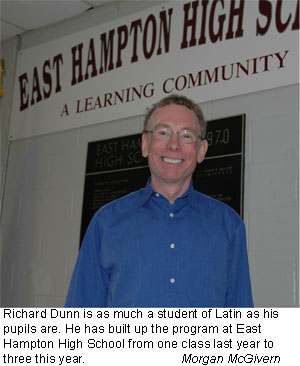I Love, You Love, We Love Latin. Classes in dead language have taken wing

Richard Dunn holds a Ph.D. in French literature, taught at the University of Chicago, has published several books and scholarly articles, and spent 25 years in international banking at Credit
Suisse. About a year and a half ago, he embarked on a new career - as a high school Latin teacher.
Mr. Dunn began teaching three Latin classes - two sections of an introduction to the language and a more advanced course - to about 60 students at East Hampton High School last week. Last year, he had just 20 students at East Hampton.
He first taught Latin at the Ross School, where he was a French instructor, in fall 2004, and he still leads classes there. When Scott Farina, the principal of East Hampton High School, heard the news, he decided that his school needed to offer the language of Caesar and Catullus, too.
At the beginning of his new career, Mr. Dunn faced just one problem: He hadn't looked at a line of the language since he was required to study it in college.
"I spent the summer working on my Latin, teaching it to myself," Mr. Dunn said. "I'm the primary student in my classes."
Although classics departments in American universities have been shrinking for years, Mr. Dunn said that Latin teachers are in demand in high schools, mostly because of the perception that it helps with the verbal portion of the SAT.
Dr. Farina agreed. "It's a great foundation for really improving English, and it certainly helps on the SATs," he said. At a school board meeting last week he called the Latin program one of "the real exciting things" offered at the high school.
But adding an extra course in a crowded building, where classrooms come at a premium, presented a challenge. Proposed high school elective classes often fall to the wayside because of space constraints. Dr. Farina managed to squeeze Mr. Dunn's classes into the chorus room. "The nice thing about Latin is that it doesn't require any special equipment," he said.
Dr. Farina said he hopes to expand the program, and would like East Hampton to offer a three-year Regents sequence in the subject. "Scott is totally committed to the Latin program. He's an enormous support," Mr. Dunn said.
"There's no doubt that Mr. Dunn is a phenomenal teacher," Dr. Farina said.
When he was in grade school, Mr. Dunn never considered taking Latin. "Actually, I took French because my parents spoke French at home as a code," he said.
He earned a bachelor's degree at Dartmouth College, then a Ph.D. in French literature at Yale. He taught French and humanities courses for six years at the University of Chicago, then began a career in international banking. Upon retiring in the late 1990s from a position as a director of Credit Suisse First Boston, he moved to East Hampton full time. In 1999, he saw an advertisement seeking a French teacher at the Ross School.
And although his true expertise is in French, he said he has found Latin more satisfying to teach. French textbooks, he said, focus on mundane, everyday activities. But because Latin is not a spoken language, the language cannot be approached in such a fashion. "In Latin, you have entire textbooks based on the life of Horace. There are components of history and literature and they're much more interesting," Mr. Dunn said.
If enrollment is any indication, East Hampton students also find Latin of interest, and the teacher engaging. Almost everyone who started Latin I last year is continuing with Latin II this semester. Helen Quigley, a senior, is one such student.
"It's probably my favorite class, she said last Thursday, while her field hockey teammates teased her.
"All she talks about is Latin and Mr. Dunn," said Jean Nolan, who is also in Latin II.
"Mr. Dunn is just a great teacher," Helen continued. "He's so nice, and he knows how to teach it so it's really interesting."
The students' appetites for Virgil and Ovid were so voracious that they asked Mr. Dunn to accelerate the class. "We're trying to squeeze two years of Latin into one so we can take the Regents," Helen said. The state exam, which they plan to take in June, is usually given after three years of study.
Mr. Dunn's enthusiasm matches that of his students.
"I taught for six years at the University of Chicago in the mid-'70s and I didn't like teaching for the life of me. I thought that I had enough," Mr. Dunn said. "These kids have such a wonderful attitude. Its just a great group of students."
